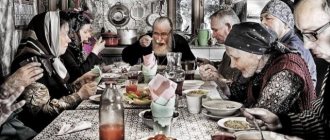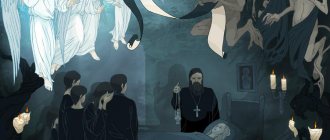Different cultures and religions have different opinions about death and the fate of the soul after the death of a person. Eastern cultures believe in reincarnation, and in Christianity they talk about eternal life after physical death. People believe that the soul of a person always comes to say goodbye to loved ones and places, and this can be noticed through certain signs and events. How the soul says goodbye to loved ones, and what scientists and researchers say about the soul, will be told by the Eden ritual agency, which provides funeral services in the Dnieper.
Opinions of different religions on the path of the soul after death
Different cultures and religions have their own attitude towards the completion of a person’s earthly journey. In Ancient Greece, they believed that a person’s life and soul are in the hands of the goddess of fate Moira, who decides where to send the soul - to Elysium or Hell.
The ancient Egyptians treated death with respect and strictly observed all ritual rites, as they firmly believed in the resurrection of the soul.
Since the Middle Ages, Christians believed in the death of the physical shell and the eternal life of the soul, which was supposed to reside in Hell for sinners or in Paradise.
Eastern cultures believe in immortality. Reincarnation can occur into a person, object, plant or animal. It is believed that the soul can be reborn 777 times, and physical death is simply a transition to another body, and there is no need to grieve too much.
Among the northern peoples there was an opinion that the soul migrates within the clan. For example, a grandmother was embodied in her grandchildren or great-grandchildren. Therefore, newborn babies were often named after deceased relatives.
For many people who have had close encounters with death and have lost loved ones, the question arises: what happens to the soul after death, and where does it go?
What are ordeals?
In the 19th century, Metropolitan Macarius of Moscow, speaking about the state of the soul after death, wrote: “It should, however, be noted that, just as in general in the depiction of objects of the spiritual world, for us clothed in flesh, features that are more or less sensual, humanoid are inevitable, so , in particular, they are inevitably admitted in the detailed teaching about the ordeals that the human soul goes through when separated from the body. Therefore, we must firmly remember the instruction given by the angel Venerable. Macarius of Alexandria, as soon as he began to speak about ordeals: “Take earthly things here for the weakest image of heavenly ones.” It is necessary to imagine the ordeals not in a crude, sensual sense, but as much as is possible for us in the spiritual sense, and not get attached to the particulars that are given by different writers and in different legends of the Church itself, despite the unity of the basic thought about the ordeals.” These extremely significant words of the angel cannot in any way diminish when we come into contact with messages about that world. For our human psyche is very inclined to take images for reality, as a result of which completely distorted ideas are created not only about heaven, hell, ordeals, etc., but also about God, about spiritual life, about salvation. These distortions easily lead a Christian into paganism. And a pagan Christian - what could be worse?
What earthly and heavenly things are being talked about here? About ordeals, which, despite the simplicity of their earthly depiction in Orthodox hagiographic literature, have a deep spiritual, heavenly meaning. There is nothing like this in any of the religious teachings. Even Catholicism, with its dogma of purgatory, distorted the picture of the posthumous state of man. Purgatory and ordeals are fundamentally different things. Purgatory, in the views of Catholic theologians, is a place of torment to compensate for the lack of human merit in satisfying the justice of God. Ordeal is a trial of conscience and a test of the spiritual state of the soul in the face of God’s love, on the one hand, and devilish passionate temptations, on the other.
Church tradition says that there are twenty ordeals - twenty certain tests of the state of the soul before, if you like, its home, which we call the Kingdom of God. These are twenty steps of ascent to this house, which can become the steps of a person’s fall - depending on his condition.
Somewhere in the 50s, one bishop died - an old, sweet, pleasant man, but it was difficult to call him a spiritual and ascetic. His death was very significant - he kept looking around him and saying: “Everything is wrong, everything is wrong. Not like that at all!”
His surprise is understandable. Indeed, although we all understand that “everything is wrong” there, we nevertheless involuntarily imagine that life in the image and likeness of this life. We imagine both hell and heaven according to Dante, and the ordeal, again, in accordance with those pictures that we look at with curiosity in simple brochures. Whether we want it or not, we cannot in any way renounce these earthly ideas.
And, surprisingly, modern science can provide us with some help in understanding this issue.
For example, nuclear physicists who study the world of elementary particles argue that in the macroworld - that is, in the world in which we live - there are no concepts that can adequately express the realities of the microworld. Therefore, in order to somehow present them to the general public, physicists are forced to find and invent words, names and images taken from our usual experience. True, the picture sometimes emerges as fantastic, but understandable in its constituent parts. Well, for example, imagine - time flows backwards. What does it mean - backwards, how can this time flow in reverse? First the duck falls, and then the hunter shoots? This is absurd. But one of the theories of quantum mechanics points in this way to the processes occurring in the intra-atomic world. And it seems that we are beginning to understand something... although without understanding anything.
Or take the concept of a wave particle, called “waveicle” in English. If you think about it, this is a rather absurd expression - a wave cannot be a particle, and a particle cannot be a wave. But with the help of this paradoxical concept, which does not fit into the framework of our common sense, scientists try to express the dual nature of the nature of matter at the level of the atom, the dual aspect of elementary particles (which, depending on the specific situation, appear either as particles or as waves). Modern science offers many such paradoxes. How are they useful to us? By what they show: if a person’s capabilities are so limited in knowing and expressing in “human language” the realities of this world, then, obviously, they are even more limited in understanding the world of that world. This is the main thing to keep in mind when trying to comprehend the same ordeals and, in general, the posthumous existence of the soul. The realities there are completely different, everything there is not the same as here.
Posthumous exam for goodness
According to church teaching, after a three-day stay at the tomb, the soul of the deceased contemplates the heavenly abodes from the 3rd to the 9th day, and from the 9th to the 40th day it is shown the torment of hell. How can we understand these earthly images, “earthly things”?
The soul, being by nature a resident of that world, freed from the plump body, becomes capable of seeing that world in a completely different way, characteristic of it, in contrast to the body. There everything is revealed to the soul. And if, as the Apostle Paul writes, in earthly conditions we see “as if through a glass darkly,” then there “face to face” (1 Cor. 13:12), that is, as it really is. This vision or knowledge, in contrast to earthly knowledge, which is mainly external in nature and often purely rational, after the death of the body acquires a different character - participation in what is known. In this case, participation means the unity of the knower with the known. So the soul there enters into unity with the world of spirits, for it itself is spiritual in this sense. But with what spirits does the soul unite? We can believe that each virtue has its own spirit, its own angel, just as each passion has its own spirit, its own demon. But more on that later.
For some reason, it is usually believed that the soul is tested only when it comes to its passions, that is, in the period from the 9th to the 40th day. However, there is no doubt that the soul is tested for everything: both for good and for evil.
So after three days, a kind of personality test begins. First - in the face of good. The soul follows the path of all the virtues (according to the Apostle, these are “love, joy, peace, long-suffering, goodness, mercy, meekness, self-control,” etc. - Gal. 5; 22). For example, the soul finds itself in the face of meekness. Will she perceive it as that precious quality that she strove for and that she was looking for in her earthly life, although she could not acquire it in those conditions, or, on the contrary, will she be repelled by meekness as something alien and unacceptable? Will she unite with the spirit of meekness or not? Thus, during six earthly days there will be a special test of the soul in the face of all virtues.
At the same time, I would like to note that every virtue is beautiful, for God Himself is ineffable Beauty, and the soul with all its fullness sees there the beauty of these properties of God. And in this, if you like, “exam of goodness,” the soul is tested: has it, in the conditions of earthly freedom, acquired at least some desire for this eternal Beauty?
And the exam for evil
A similar test, the same examination of the soul continues, from the 9th to the 40th day. A stage begins, which is usually called ordeals . There are twenty of them, and much more is said about them than about contemplating the beauty of virtues. The reason for this, apparently, is that the overwhelming majority of people are immeasurably more enslaved by passions than they are involved in virtues. That is why this exam requires more time. Here the soul reveals the full power of each of its passions - hatred, envy, pride, deceit, fornication, gluttony...
We all know what the fire of passion means - despite reason, despite the desire for good, despite even one’s own well-being, a person suddenly submits, for example, to insane anger, greed, lust, and so on! Submits to a “favorite” passion or passions. This very thing begins there, but in the face of not just conscience, not just convictions - but in front of that Shrine itself, in the face of that Beauty that has just been revealed to the soul in all its possible completeness. It is here that the power of passion that a person acquired during earthly life is revealed in its entirety. Therefore, the one who did not fight passion, but, moreover, served it, for whom it became the meaning of his life, will not be able to renounce it even in the face of God’s Love itself. So there is a breakdown at the ordeal and the descent of the soul into the bosom of a meaningless and unquenchable fire of burning passion. For under earthly conditions passion could sometimes still obtain food for itself for some time. There the torment of Tantalus really opens up.
By the way, ordeals with the most seemingly innocent sin. From idle talk. From something to which we usually do not attach any importance. The Apostle James says exactly the opposite: “... the tongue... is an uncontrollable evil; it is filled with deadly poison” (James 3; 8). And the Holy Fathers and even pagan sages call idleness and its natural and usual manifestation - idle talk - the mother of all vices. Rev. John of Karpafsky, for example, wrote: “Nothing upsets a usually good mood more than laughter, jokes and idle talk.”
The twenty ordeals cover, I would say, twenty categories of passions, not specific sins, but passions, each of which includes many varieties of sins. That is, each ordeal covers a whole nest of related sins. Let's say theft. It has many types: direct, when someone got into a person’s pocket, and accounting additions, and inappropriate, in one’s own interests, use of budget funds, and bribes for the purpose of profit, etc. and so on. The same applies to all other ordeals. So - twenty passions, twenty exams for sins.
In very vivid, earthly concepts and expressions it is written about the ordeals in the life of St. Basil the New, where Blessed Theodora talks about what happened to her beyond the boundaries of earthly life. And reading her story, you involuntarily remember the wonderful words of the angel: “Take earthly things here for the weakest image of heavenly ones.” Blessed Theodora saw monsters there, lakes of fire, and terrible faces, heard terrible screams, and observed the torment to which sinful souls were subjected. All these are “earthly things.” In reality, as the angel warned us, this is only a “weak image,” a weak semblance of those completely spiritual (and in this sense, “heavenly”) events that happen to a soul that is unable to reject passions. Everything is wrong there!
But why, in this case, is it shown this way? The reason is that there are no other means to warn a person still living about the suffering that awaits everyone who tramples on conscience and truth. For example, how to explain the effect of radiation to a person who has no idea about it and does not understand its destructive effect on the body? Apparently, it would be necessary to say that terrible invisible rays emanate from this place; a pagan would be more likely to understand if he was warned that evil spirits live here, or, on the contrary, this place is sacred and should not be approached...
- Do you understand, man?
- Got it.
What did he understand? Not what radiation is, not how it works, but most importantly: there is a serious danger here, you need to be extremely careful. So it is with paintings of ordeals. Yes, there is suffering, and it is caused by an unrighteous lifestyle.
But Blessed Theodora also speaks about demons who torment the soul for sins.
Uniting with the Spirit of God or with tormenting demons
Entire iconographic cycles were created based on the life of St. Theodora. Perhaps many have seen books with pictures depicting various tortures at ordeals. The artists' imagination is very strong and vivid, and therefore these pictures are impressive. When you look, what is not happening there: what torment, torture! And there really is torment there, but it is of a completely different nature. This is important to know, because it is of great importance for understanding the afterlife of all people, including non-Christians.
So, we come to the question of the action of demons on the soul in the afterlife. A very interesting thought on this issue was expressed by Saint Theophan the Recluse (Govorov) in his interpretation of the 80th verse of the 118th Psalm (“Be my heart blameless in your justification, so that I will not be ashamed”). This is how he explains the last words: “The second moment of non-shame is the time of death and the passage of ordeals. No matter how wild the thought of ordeals may seem to smart people, they cannot be avoided. What are these Mytniks looking for in those passing by? Whether they have their goods. What is their product? Passion. Therefore, whoever has an immaculate heart and is free from passions, they cannot find anything to which they could become attached; on the contrary, the quality opposite to them will strike them themselves like lightning arrows. To this, one of the little learned people expressed another thought: ordeals seem to be something terrible; but it is very possible that demons, instead of something terrible, represent something lovely. Seductively and charmingly, according to all types of passions, they present to the passing soul one after another. When, during earthly life, passions are expelled from the heart and virtues opposite to them are implanted, then whatever charming thing you imagine, the soul, which has no sympathy for it, passes it by, turning away from it with disgust. And when the heart is not cleansed, then for which passion it most sympathizes, that is why the soul rushes there. The demons take her as if they were friends, and then they know where to put her. This means that it is very doubtful that the soul, while it still has sympathies for the objects of any passions, will not be ashamed at the ordeal. The shame here is that the soul itself is thrown into hell.”
Thought of St. Theophan follows the instructions of St. Anthony the Great. I will also quote his wonderful words: “God is good and impassive and unchanging. If anyone, recognizing that it is blessed and true that God does not change, is nevertheless perplexed as to how He (being such) rejoices over the good, turns away from the evil, is angry at sinners, and when they repent, is merciful to them; then to this it must be said that God does not rejoice and is not angry: for joy and anger are passions. It is absurd to think that the Divine would be good or bad because of human affairs. God is good and does only good things, but does not harm anyone, being always the same; and when we are good, we enter into communication with God, out of similarity with Him, and when we become evil, we separate from God, out of dissimilarity with Him. Living virtuously, we become God's, and when we become evil, we become rejected from him; and this does not mean that He has anger against us, but that our sins do not allow God to shine in us, but unite us with demons tormentors. If we then gain permission from our sins through prayers of good deeds, this does not mean that we have pleased God and changed Him, but that through such actions and our turning to God, having healed the evil that exists in us, we again become capable of tasting God’s goodness; so to say: God turns away from the wicked is the same as saying: the sun is hidden from those deprived of sight.”
In short, when we lead a correct (i.e. righteous) life, live according to the commandments and repent of violating them, then our spirit unites with the Spirit of God, and good things happen to us. When we act against our conscience and violate the commandments, our spirit becomes one with the tormenting demons, and thus we fall into their power. And according to the degree of our voluntary consent to sin, our voluntary submission to their power, they torment us. And if there is still repentance on earth, then it is already too late. But it turns out that it is not God who punishes us for our sins, but we ourselves, through our passions, give ourselves into the hands of tormentors. And their “work” begins - they are a kind of predators or sewer trucks that cleanse the environment of sewage. This is what happens to the soul after death at the ordeal.
The ordeal, therefore, is essentially nothing more than a kind of test of a person’s passions. Here a person shows himself - who he is, what he strived for, what he wanted. But they are not only a test - they are also a guarantee of the possible purification of the soul through the prayers of the Church.
“Passion a thousand times stronger than on earth...”
But, apparently, it is necessary to say once again what passion . We know about sin: for example, a person deceived, stumbled, this happens to everyone. Passion is something else - something that already pulls towards itself, and sometimes so irresistibly that a person cannot cope with himself. Although he understands perfectly well that this is bad, that it is bad, that it is harmful not only for the soul (although he most often forgets about the soul), but also for the body, he cannot cope with himself. In the face of conscience, in the face, if you like, of one’s own good, he cannot cope! This state is referred to as passion.
Passion is a truly terrible thing. Look what people do in the madness of passion, in the slavery of passion. They kill, maim, betray each other.
The Slavic word “passion” means, first of all, suffering, as well as a strong desire for something forbidden, sinful - that is, ultimately, also suffering. Passions are suffering. Christianity warns that all passions, being sinful, bring suffering to a person, and only suffering. Passion is a deception, it is a drug, it is a delight! After death, the real action of passions, their real cruelty, is revealed.
All our sins are committed when the soul is united with the body. A soul without a body can neither do good nor sin. The Fathers definitely say that the seat of passions is the soul, and not the body. The roots of passions are not in the body, but in the soul. Even the grossest bodily passions are rooted in the soul. That is why they do not go out, do not disappear with the death of the body. With them a person leaves this world.
How do these unresolved passions manifest themselves in that world? I will quote the thought of Abbot Nikon (Vorobyov): “Pasions a thousand times stronger than on earth will burn you like fire without any possibility of quenching them.” This is extremely serious.
Here on earth it is easier with our passions. So, I fell asleep - and all my passions fell asleep. For example, I get so angry at someone that I’m ready to tear him to pieces. But time passed and the passion gradually subsided. And soon they became friends. Here you can fight vices. In addition, passions are covered up by our physicality and therefore do not act in full force - or rather, rarely and, as a rule, they do not act this way for very long. But there a person, freed from physicality, finds himself confronted with their full action. Complete! Nothing interferes with their manifestation, the body does not close them, no sleep distracts them, no fatigue extinguishes them! In a word - continuous suffering, since the person himself does not have “any opportunity to satisfy them”! Plus, demons seduce us and then inflame and multiply the effect of our passions.
I was told how during World War II, after the Leningrad blockade was lifted, a woman ran up to a huge line for bread in the rear and hysterically shouted: “I’m from Leningrad.” Everyone immediately parted when they saw her crazy eyes, her terrible state. This is what only one passion is. Passion is a serious illness, the cure of which requires a lot of work and a long time. That is why it is so dangerous not to fight sin - often repeated, it turns into passion, and then real trouble comes not only in this life, but, what is a thousand times worse, in the next. And when a person has a whole bunch of passions? What will happen to him in Eternity?! If only this one thought were deeply rooted in us, we would, without a doubt, begin to approach our lives completely differently.
That is why Christianity, as a religion of love, reminds us: remember, man, you are not a mortal, but an immortal being, and therefore prepare for immortality. And the great happiness of Christians is that they know about this and can prepare. On the contrary, what horror does the unbeliever and the ignorant face after death!
Twenty ordeals reveal the state of a person’s soul, they are nothing more than twenty kind of litmus tests, twenty, if you like, exams, at which all its spiritual content is revealed and its fate is determined. True, it is not yet final. There will be more prayers from the Church, there will be a Last Judgment.
Like connects with like. The Power of Repentance
Each stage of ordeal is a test of the strength of the rootedness of a certain passion in a person, when its full strength is revealed. The one who did not fight passion, who obeyed it, who lived this passion, cultivated it, gave all the strength of his soul to its cultivation - falls, breaks down in this ordeal. And this - either a fall or going through an ordeal - is no longer determined by the effort of a person’s will, but by the action of the spiritual state prevailing in him. Abbess Arsenia, one of the remarkable ascetics at the turn of the 20th century (1905), wrote: “When a person lives an earthly life, he cannot know how enslaved his spirit is, depending on another spirit, he cannot fully know this because he has a will with which he acts as he pleases. But when the will is taken away with death, then the soul will see to whose power it is enslaved. The Spirit of God brings the righteous into eternal abodes, enlightening them, illuminating them, idolizing them. The same souls who had communion with the devil will be possessed by it.”
In other words, if we on earth do not fight small temptations, do not resist their pressure, then we thereby weaken our will and gradually destroy it. And there, in the face of a 1000-fold greater power of passion, our will will be taken away altogether, and the soul will be in the power of the tormenting demon. It is this last point that I would like to say again.
If we turn to the description of the ordeals, we find the spirits of evil present there everywhere – in different forms. Blessed Theodora even describes the appearance of some of them, although it is clear that these are only weak semblances of their true being. The most serious thing - we have already emphasized this - is that, as Anthony the Great writes, the soul, submitted to passion, unites there with tormenting demons. And this happens, so to speak, naturally, for like always connects with like. In the conditions of earthly life, we also unite with people of the same spirit. Sometimes they wonder - how did these people get together? Then, upon closer acquaintance, it turns out: they have the same spirit! They are unanimous. A single spirit united them.
When the soul goes through ordeals, it is tested by the passion of each ordeal, by its spirits, tormenting demons, and, according to its state, it is either torn away from them or united with them, falling into the most severe suffering.
There is another side to this suffering. That world is a world of true light, in which all our sins will be revealed to everyone; in the face of all friends, acquaintances, and relatives, everything that is crafty, base, and unscrupulous will suddenly be revealed. Just imagine such a picture! That is why the Church calls everyone to prompt repentance. Repentance in Greek is metanoia, that is, a change of mind, way of thinking, a change in the goals of one’s life, aspirations. Repentance also means hatred of sin, aversion to it.
This is how wonderfully St. speaks about this. Isaac the Syrian: “Because God knew by His merciful knowledge that if absolute righteousness were required of people, then only one in ten thousand would be found who <could> enter the Kingdom of Heaven, He gave them a medicine suitable for everyone,< “namely, repentance, so that every day and at every moment there will be a means of correction available to them through the power of this medicine and so that through contrition they will wash themselves at all times from any defilement that may happen, and be renewed every day through repentance.” .
What does true repentance give? Take Raskolnikov from Dostoevsky's Crime and Punishment. Look: he was ready to go to hard labor, even to go with joy, just to atone for his evil, to return to his previous state of soul. This is what repentance is: it really is a change of the soul, its salvation.
And even a small striving for good and repentance for evil can become the drop that tips the scales towards God. This drop, or, as Barsanuphius the Great said, this “copper obol”, quite insignificant, becomes the guarantee that the Lord unites with such a soul and defeats the evil that is present in it.
This is the enormous significance of sincere repentance and sincere struggle in this life of ours. They become the key to saving the passage of ordeals.
We Christians must be infinitely grateful to God for the fact that He revealed to us in advance the posthumous secret of the ordeals, so that here we would struggle with our bad inclinations, fight and repent. For if, I repeat, a person has even a small germ of such a struggle, if there is at least some compulsion to live according to the Gospel, then the Lord Himself will fill in what is missing and free us from the hands of destroying demons. The word of Christ is true: “You have been faithful over a few things, I will make you ruler over many things; enter into the joy of your Master” (Matthew 25:23).
Christianity provides the greatest means of human salvation - repentance. The Lord wants us not to suffer here, and especially after death. Therefore, the Church calls: man, before it’s too late, take care of yourself...
We are free to do good and evil
Why, when talking about a person’s posthumous path, do we constantly emphasize that it is a test of the soul - first for good, and then for evil? Why the test?
Because God, in the very creation of man, gave him His image, which presupposes such freedom that God Himself cannot touch. For He needs free individuals, not slaves. Salvation is His free election, out of love for truth, holiness and beauty, and not for the sake of “spiritual” pleasures or the threat of punishment.
Why did God humble himself to the point of the cross, and not appear to the world as an all-powerful, wisest, invincible king? Why did He come to people not as a patriarch, not a bishop, not a theologian, not a philosopher, not a Pharisee, but as a beggar, homeless, from an earthly point of view, the last person who does not have a single external advantage over any person? The reason for this is obvious: power, power, external splendor, glory would certainly captivate the whole world, everyone would slavishly worship Him and “accept” His teaching in order to receive as much as possible... bread and circuses. Christ wanted nothing but the truth to attract a person to Him, nothing external to replace it, not to stand in the way of its acceptance. It is no coincidence that the Lord uttered such meaningful words: “For this I was born and for this I came into the world, to testify to the truth; everyone who is of the truth listens to my voice” (John 18:37). External effects are idols that throughout human history have been trying to replace God.
Unfortunately, much of church life has followed the path of external, so-called “church” splendor, or rather purely worldly splendor. This brings to mind the words of one American Protestant, who not only did not hesitate, but, on the contrary, proudly shared: “In our church, everything should be entertaining in order to attract people.” And the spiritual law is known: the more outside, the less inside. Even at the beginning of the 16th century, the Monk Nilus of Sorsky tried to defend non-covetousness in monasticism, spoke out against all luxury, wealth and estates in the Church as degrading and unnatural, but his voice was not accepted, or rather, was rejected - the process of secularization of Christian consciousness turned out to be irreversible. And it is quite obvious that it led to the split of the 17th century, Peter I, the October Revolution, and at the end of the 20th century - to the so-called “perestroika”. And it will lead to even worse. For the Church is the “leaven” of society, and its spiritual state determines the internal and external well-being of the people.
Saint Philaret of Moscow said bitterly in the 19th century: “How boring it is to see that monasteries all want pilgrims, that is, they themselves seek entertainment and temptation. True, sometimes they lack methods, but what they lack more is non-covetousness, simplicity, hope in the Gods, and a taste for silence.” And he: “If war had to be declared on any clothing, then, in my opinion, not on the hats of priestly wives, but on the magnificent robes of bishops and priests. At least this is the first thing, but this was forgotten. “Let your priests, O Lord, be clothed with righteousness.” Perhaps even now there will be a saint who will say similar things about modern church life.
So the Lord, with his coming, showed that he is not only the greatest Love; but also the greatest Humility, and He cannot exert any, even the slightest, pressure on human freedom, therefore salvation is possible for everyone who freely accepts God and responds to Love with love. From here it becomes clear why earthly living conditions are so important. Only while in the body is a person fully human and can do good or evil, sin, break the commandments, or repent and lead a righteous life. Our freedom, our choice, is exercised on earth. After death there is no longer a choice, but the choice made on earth is realized, and the fruits of earthly life are revealed. The soul simply finds itself faced with the result of all human earthly activities. Therefore, there, in another world, a person is already powerless to change himself - he can only be helped. But more on that later.
What happens next in that life, after the soul has passed the tests from the 9th to the 40th day?
On this day, one might say, the initial outcome of life is summed up. The 40th day , if you like, is the first gathering of the fruits of a person’s earthly life. The Church teaches that the soul presents itself to the throne of God, before which God’s determination about man takes place. But it would also be correct to say: man’s self-determination occurs in the face of God. After all, God does not commit any violence against any person. God is the greatest, ultimate Love and Humility. Therefore, when on the 40th day the soul comes before God in some special way, then, apparently, here its spiritual state is fully revealed to it and its natural union occurs either with the Spirit of God or with the spirits of tormenting passions. The Church calls this a private court , a private determination of a person.
Only this judgment is unusual - it is not God who judges and condemns man, but man, finding himself in the face of the Divine shrine, either ascends to Him, or, on the contrary, falls into the abyss. And all this no longer depends on his will, but on that spiritual state that was the result of his entire earthly life.
However, God’s determination on the 40th day, according to the teachings of the Church, is still not the last judgment. There will be another and final one, it is called the Last Judgment. On it, the fate of many, many people, through the prayers of the Church, will change.
From the book “The Afterlife of the Soul”
What happens to the soul after death?
Christianity has different directions, and there are just as many variations on the theme of what happens to the soul after the death of a person. There are many popular superstitions and speculations that do not have reliable confirmation. Some of them are completely rational, and some are just guesswork. According to the Orthodox Church, the soul of the deceased goes through several stages after death:
- Saying goodbye to your physical shell.
- Stay on earth for some time and visit your native places.
- Ordeal.
- Ascension to heaven.
- God's judgment.
- Moving to Hell or Heaven.
All stages are cyclical and take place on certain days on which the soul needs the support of loved ones in the form of prayer and memorial services.
Why doesn't the dead man calm down?
There are concepts of ghosts, ghosts, poltergeists, spirits - these are restless souls that remind the living of themselves. Why is this happening:
- sudden death, unfinished business;
- features of activity when a sorcerer, magician, psychic dies;
- occult activities of relatives;
- circumstances of death and funeral (suicide, someone did not come to the funeral).
It is possible to find out whether the deceased is at rest only after 40 days. Orthodox Christians can turn to priests for help.
Ghosts and ghosts
Ghosts and ghosts appear if after 40 days the soul remains restless and wanders. How one chooses a place of refuge: one’s home, a place of death, or simply something significant during one’s life. In occultism, ghosts are endowed with negativity: they are aggressive and take revenge because they cannot leave the earth. Less common are data on peace-loving ghosts.
Another subspecies is the poltergeist. He is an arsonist, a bully, an irritant. Because of it, people hear footsteps, noise, and the sounds of breaking dishes. Not a full-fledged ghost, but part of the soul, a bundle of energy. This could be part of someone who died in the fire.
The Slavs called restless souls pawned dead or navyu. They wandered the earth, over time became evil spirits, and were reborn into animals. This group included:
- suicides;
- drunkards;
- sorcerers;
- drowned people;
- unbaptized children.
They were buried by good people, but without honor. Roadsides and vacant lots were set aside because there was no room for them with “clean” dead bodies.
A ghost appears only once, but a ghost materializes regularly. There are entities tied to a specific place: where a tragedy, a catastrophe, a murder occurred. They take over the territory, strange, inexplicable things happen in the house. Residents are overwhelmed by fear, illness, and their lives are falling apart.
Others are free to move, but are tied to a person - this is a killer, an enemy, or simply an ill-wisher. The ghost's task is to take revenge on him and his loved ones. He pursues him everywhere until he atones for his guilt.
Some of the dead voluntarily renounce their heavenly existence and remain on earth in the form of spirits. In the Slavic tradition there was the concept of the Guardian of the Family, in this case the soul performs the same functions.
Cats see spirits
She protects the living, takes care of newborns and children. Psychics often enlist the support of deceased relatives for a ritual and call on them for help. They are not dangerous for the sorcerer himself or others.
Dead souls cannot influence the souls of the living. They are in different ephemeral planes. Helpers are a source of energy for magic, not its tool.
Exit of the soul from the body
There is an opinion that the soul leaves the body and is present next to it in the form of subtle matter, invisible to the eye of a living person. This is not a ghost, this is a certain clot of energy. In the first minutes after death, the soul does not realize that death has occurred, and only after a while does it realize that it is looking at the body from the outside. After realizing that death has occurred, the soul can leave the scene and visit dear people and familiar places.
The phenomenon of clinical death has not yet been fully studied. But those who had to go through this experience talk about:
- Emptiness and silence around.
- A long dark tunnel.
- Bright light at the end of the tunnel.
- A strong desire to go into the light.
For some reason, the soul turns off the path and does not follow the alluring light, and thus returns to its body. Scientists, through repeated research, have given their explanation for this tunnel phenomenon. It turns out that at the moment of cardiac arrest, strong brain activity occurs. Because of this hyperactivity, a person at the moment of death can see a tunnel with light, images of loved ones, or footage of a past life. About 20% of people who have experienced clinical death report such visions.
Close relatives of the deceased
© KatarzynaBialasiewicz/Getty Images Pro
One of the most difficult times in life is when a loved one dies. We miss his physical presence, his hugs and his voice - in short, those physical attributes that we associate with our family, friends or close relatives.
It is difficult to accept the fact that a loved one leaves us forever and moves on to the next stage of existence. But life takes a new turn and offers you the opportunity to see the other side of death.
You have a chance to realize that your deceased relative was much more than just the physical form: skin, muscles and bones. We are talking about the spiritual, not the physical component of a person.
After all, the body was only his earthly shell, an external disguise, in which for some time the indestructible essence of man was located.
The death of your loved ones, in addition to suffering and grief, brings you new discovery and understanding, and you are given the opportunity to strengthen your relationship with the soul of a person close to you.
This understanding will help you awaken and realize that your departed loved ones are much more than just a physical shell.
Here are 8 important things you should understand about the death of your loved ones.
Farewell to loved ones
The period of farewell to loved ones begins from the moment of death and lasts three days. People believe that the spirit can make itself known by a bird flying into the house, knocking, or footsteps. Quite often on such days, homeless animals come to the house of the deceased; they should not be driven away. These signs are not long-lasting and not frightening. Some people may feel the presence of the spirit of the deceased in the house; at such moments it is recommended to read a prayer and light a church candle. Next, the soul of the deceased can go traveling to his native places.
If the death was sudden or violent, the soul suffers due to its early death. The greatest pain is felt by the souls of suicides who understand that they have no forgiveness. The state of mind can be partially alleviated by relatives who, from the moment of the death of a person, accept mourning, put on black clothes, order the organization of a funeral, pray and mourn the deceased.
Calls from the other world
Some people who have experienced the death of a loved one have repeatedly received calls from strange numbers. When answering a call, a loud noise and crackling noise was heard, and when trying to call back, it turned out that the number did not exist.
Yorkshire Terrier and Labrador at risk: which dogs are susceptible to obesity
Real damage from unrealistic dolls: why Barbies can be dangerous for children
Scientists have discovered 55 previously unknown chemicals in the human body
These types of calls are made by dead people. At such moments, the curtain between worlds opens. Phrases are usually short. Callers usually warn of danger or ask for help. Some dead people do not even suspect that they are no longer in the world of the living, so they call their relatives.
Ninth day after death
On the 9th day after death, a wake is held. They pray for the soul of the deceased, order a funeral lunch, and visit the cemetery. Funeral rituals help the soul of the deceased to get rid of earthly attachments, to cleanse himself of sins, so that she quickly realizes that she will soon leave this world and move on to another.
From the ninth to the fortieth day, the soul goes through ordeals, namely tests before ascension. If the tests are severe, the soul periodically returns to the place of its former home and to loved ones in order to receive support and strength to pass all the tests.
Ways to protect yourself from a ghost
To protect yourself from the influence of the restless, religious practitioners advise adhering to the rules.
- You need to grieve, but in moderation. Excessive lamentations and prolonged sadness keep the deceased on earth and materialize him into a ghost.
- If you are not at the funeral, light a candle in a secluded place in the evening, communicate with the deceased and apologize for not seeing him off on his last journey. Say goodbye.
- To drive a ghost out of a house, an iron or copper sharp object, or a knife, is stuck into the place where it appears.
- Listen to the signals. If the ghost of a friend told you something or asked you to do something, do it. He will calm down and leave. Today, the dead even use the telephone and SMS.
- Don't talk to ghosts of strangers, don't turn your back. Put something on backwards and walk away. You are allowed to read a prayer and dismiss the vision.
There have been cases when spirits calmed down when they were buried according to accepted customs. They may indicate the place of death. Another option is to help finish what was started on earth. The dead are found everywhere, not only in cemeteries.
Although eyewitness accounts of ghosts have been recorded, they have not been scientifically proven. They exist in the form of semi-legends; science has not been able to record a single spirit using accessible methods. For superstitious people, it is important to say goodbye to the deceased correctly and know that he has found peace.
All over the world, different cultures have developed unique legends about the path of the soul after death, special burial traditions and about the dead in the form of ghosts. You shouldn’t be terribly afraid of death, but you need to respect it. Also, when saying goodbye to loved ones, the psychological factor is taken into account: sometimes voices, noise, visions are the body’s defense mechanism against stress, and not supernatural events.
Fortieth day after death
For 40 days after death, the soul is convicted of mortal sins and temptations. At this stage, the prayers of relatives serve as ransom and purification. The more sins a person has committed during his lifetime, the more severe the ordeals assigned to him. In Orthodoxy, this day is associated with the Ascension of Jesus Christ. And religion says that on this day the soul goes to God’s Judgment.
Mandatory on this day are a funeral service, ordering a service in the church, visiting a cemetery, distributing a memorial service and alms. On the 40th day, the soul completely leaves the earth, and no longer has the opportunity to visit family and friends.
The version about how the soul of the deceased says goodbye to loved ones and native places is figurative and has no factual confirmation. A person can only speculate on the basis of the Bible what happens to the soul after death, but he will only be able to find out about this when his time comes.
Reflection in the mirror
There are many cases where relatives and close people saw the reflection of the deceased in a mirror, TV screen or computer monitor. Silhouettes appeared for a few seconds and disappeared. This usually happens when a deceased person comes to say goodbye. He gives a sign that death is not the end, but the beginning of a new eternal life.
Living people who see the reflection of a deceased person often begin to think that their imagination is running wild. Actually this is not true. American doctor and psychologist Raymond Moody, in one of his books about life after death, said that through a mirror you can establish contact with the deceased. This is an ancient technique that was previously used by priests. There were no mirrors at that time, so people used bowls of water.











